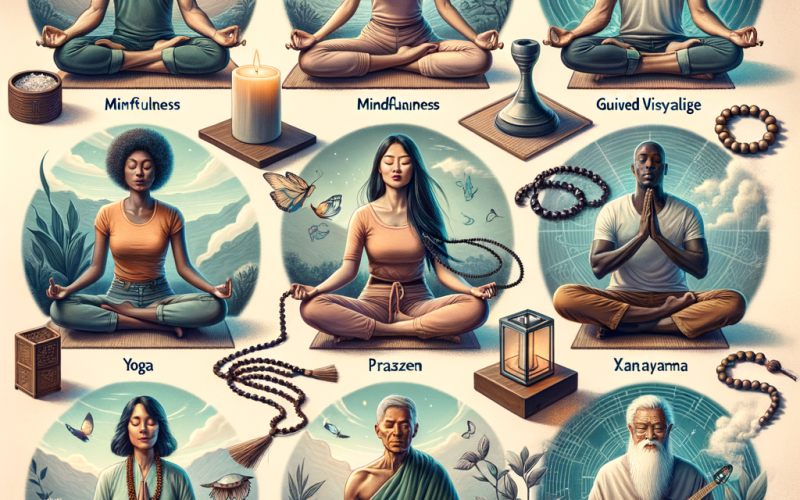About the Author:
Sarah Jones is a certified mindfulness coach and meditation instructor with over 10 years of experience helping individuals from all walks of life manage stress and cultivate inner calm. Through her workshops and online courses, Sarah empowers people to create a daily practice of mindfulness that leads to greater well-being and a more fulfilling life.
Introduction:
Do you ever feel like you’re one email away from a meltdown? You’re not alone. In today’s hyper-connected world, it’s easy to get swept away in a constant current of deadlines, demands, and information overload. This relentless pressure can leave us feeling stressed, anxious, and on the verge of burnout. But what if there was a simple, yet powerful tool that could help you find peace and clarity amidst the chaos? Enter meditation.
For centuries, meditation has been practiced in various cultures as a way to cultivate inner peace and well-being. While it may conjure up images of monks sitting cross-legged for hours on end, meditation is not about emptying your mind or achieving some mystical state. At its core, meditation is about training your attention and awareness. By learning to focus your mind and observe your thoughts and feelings without judgment, you can develop a sense of inner calm and resilience that translates into all aspects of your life.
This article is specifically designed for busy professionals, students, and anyone else who feels like they’re constantly on the go. We understand that carving out large chunks of time can be a challenge, so we’ll focus on techniques that can be practiced in just 10 minutes. By incorporating these practices into your daily routine, you’ll equip yourself with the tools to manage stress effectively and cultivate a sense of inner calm that will benefit all aspects of your life.
The Science Behind Meditation for Stress Relief
The benefits of meditation are not just anecdotal. A growing body of scientific research suggests that meditation can have a profound impact on both our mental and physical well-being. Studies have shown that meditation can:
- Reduce stress hormones: One study published in the Journal of the American College of Cardiology found that meditation can decrease levels of cortisol, a key stress hormone [1]. This can lead to a reduction in stress symptoms like anxiety, fatigue, and high blood pressure.
- Improve brain function: Research from Harvard University suggests that meditation can increase the thickness of the prefrontal cortex, the area of the brain responsible for focus, attention, and decision-making [2]. This can lead to improved cognitive function, memory, and emotional regulation.
- Enhance emotional well-being: A meta-analysis published in the Journal of Clinical Psychiatry found that meditation programs can significantly reduce symptoms of anxiety and depression. By cultivating a sense of calm and awareness, meditation can help you develop a more positive outlook and better manage difficult emotions.
These are just a few of the many potential benefits associated with meditation. As research continues, we are likely to discover even more ways in which meditation can improve our overall health and well-being.
Simple Meditation Techniques for Busy People
Even if you have a jam-packed schedule, you can still reap the benefits of meditation. Here are three simple techniques that you can easily incorporate into your day, even if you only have 10 minutes:
- Focusing on the Breath:
This is a classic and highly effective meditation technique. Find a quiet place where you can sit comfortably. Close your eyes or soften your gaze. Take a few slow, deep breaths, feeling your abdomen rise and fall with each inhalation and exhalation. Focus your attention on the sensation of your breath moving in and out of your body. If your mind wanders, gently bring your focus back to your breath without judgment.
- Body Scan Meditation:
This technique helps to cultivate body awareness and reduce physical tension. Lie down comfortably on your back or sit in a chair with your feet flat on the floor. Close your eyes or soften your gaze. Take a few deep breaths and begin to scan your body from head to toe. Notice any physical sensations without judgment. You might feel tension in your shoulders, tightness in your chest, or warmth in your hands. Simply observe these sensations without trying to change them. As you complete your body scan, take a few more deep breaths and slowly come back to alertness.
- Mindfulness Meditation:
This technique involves paying attention to your thoughts and feelings without judgment. Find a quiet place to sit comfortably. Close your eyes or soften your gaze. Take a few deep breaths and focus your attention on the present moment. Notice any sounds you can hear, feelings in your body, or thoughts that arise in your mind. Don’t try to push thoughts away, simply observe them with a sense of curiosity and detachment. If your mind gets caught up in a story or a worry, gently guide your attention back to the present moment, perhaps by focusing on your breath or the sensations in your body.
These are just a few examples, and there are many other meditation techniques you can explore. The key is to find a practice that resonates with you and that you can integrate into your daily routine. Here are some additional tips for busy people:
- Start small: Don’t try to meditate for an hour right away. Begin with 5-minute sessions and gradually increase the duration as you become more comfortable.
- Be kind to yourself: It’s normal for your mind to wander during meditation. Don’t get discouraged, simply acknowledge the distraction and gently bring your focus back to your chosen anchor (breath, body sensations, etc.).
- Find a quiet space: Even if it’s just a corner of your office or a few minutes in your car during your lunch break, try to find a quiet space where you won’t be interrupted.
- Set a reminder: Schedule your meditation session in your calendar or use a meditation app that will send you a notification.
- Make it a habit: The key to reaping the benefits of meditation is consistency. Aim to practice for at least a few minutes every day, even if it’s just a quick session before bed.

Creating a Sustainable Meditation Practice
Building a sustainable meditation practice takes time and effort, but the rewards are well worth it. Here are some tips to help you overcome obstacles and integrate meditation into your daily routine:
- Identify your “why”: What are you hoping to achieve through meditation? Is it to reduce stress, improve sleep, or cultivate greater self-awareness? Having a clear purpose will help you stay motivated when challenges arise.
- Find a meditation buddy: Partnering with a friend or family member can help you stay accountable and provide support. You can meditate together or simply share your experiences.
- Join a meditation class or online community: There are many meditation classes and online communities available that can provide guidance and support. This can be a great way to learn new techniques and connect with others who are also interested in meditation.
- Be patient: Don’t expect to become a meditation master overnight. Like any new skill, meditation takes practice. Be patient with yourself and celebrate your progress along the way.
- Make it enjoyable: Meditation shouldn’t feel like a chore. Experiment with different techniques and find what works best for you. You can also listen to guided meditations or meditation music to enhance your experience.
The Benefits of Meditation Extend Beyond Stress Relief
While stress reduction is a major benefit of meditation, the positive effects extend far beyond managing a hectic schedule. Here are a few additional ways meditation can enhance your life:
- Improved Focus and Concentration: Meditation can help train your attention and reduce mind-wandering, leading to improved focus and concentration in all areas of your life, from work and studies to everyday tasks.
- Enhanced Self-Awareness: By cultivating a sense of present-moment awareness, meditation can help you become more aware of your thoughts, feelings, and physical sensations. This increased self-awareness can empower you to make more conscious choices and respond to situations with greater clarity.
- Better Sleep Quality: Chronic stress can significantly disrupt sleep patterns. Meditation can help reduce stress and anxiety, which can lead to deeper, more restful sleep.
- Increased Emotional Resilience: Meditation can help you develop a more balanced and objective perspective on your emotions. By observing your thoughts and feelings without judgment, you can learn to manage difficult emotions more effectively and bounce back from challenges more quickly.
- Greater Sense of Well-being: The cumulative effect of a regular meditation practice can lead to a greater sense of inner peace, calm, and well-being. This can translate into improved relationships, increased creativity, and a more fulfilling life overall.
Meditation Resources for Further Exploration
If you’re interested in learning more about meditation and exploring different techniques, here are some helpful resources:
- Books:
- “Wherever You Go, There You Are” by Jon Kabat-Zinn
- “10% Happier” by Dan Harris
- “Mindfulness in Plain English” by Bhante Gunaratana
Websites:
- Insight Timer‑‑
- Headspace
- UCLA Mindful Awareness Research Center
Apps:
- Calm
- Insight Timer
- Headspace
Conclusion: Find Your Moment of Calm
In today’s fast-paced world, it’s easy to feel like we’re constantly on the verge of burnout. But remember, you don’t have to become another statistic. By incorporating just 10 minutes of meditation into your daily routine, you can equip yourself with powerful tools to manage stress, improve focus, and cultivate inner peace.
Meditation isn’t about achieving some mystical state or emptying your mind. It’s about training your attention and becoming more aware of your thoughts and feelings without judgment. This simple practice can have a profound impact on your mental, emotional, and physical well-being.
The beauty of meditation lies in its accessibility. You don’t need any special equipment or a dedicated meditation room. All you need is a quiet space and a few minutes of your time. There are numerous techniques to explore, so find one that resonates with you and fits seamlessly into your schedule.
Remember, consistency is key. Even a few minutes of daily meditation can significantly reduce stress and improve your overall well-being. Think of it as an investment in yourself – a chance to create a pocket of calm amidst the chaos and cultivate a more mindful and fulfilling life.
So, take a deep breath, find a quiet corner, and embark on your journey to a calmer, more centered you. You deserve it.










